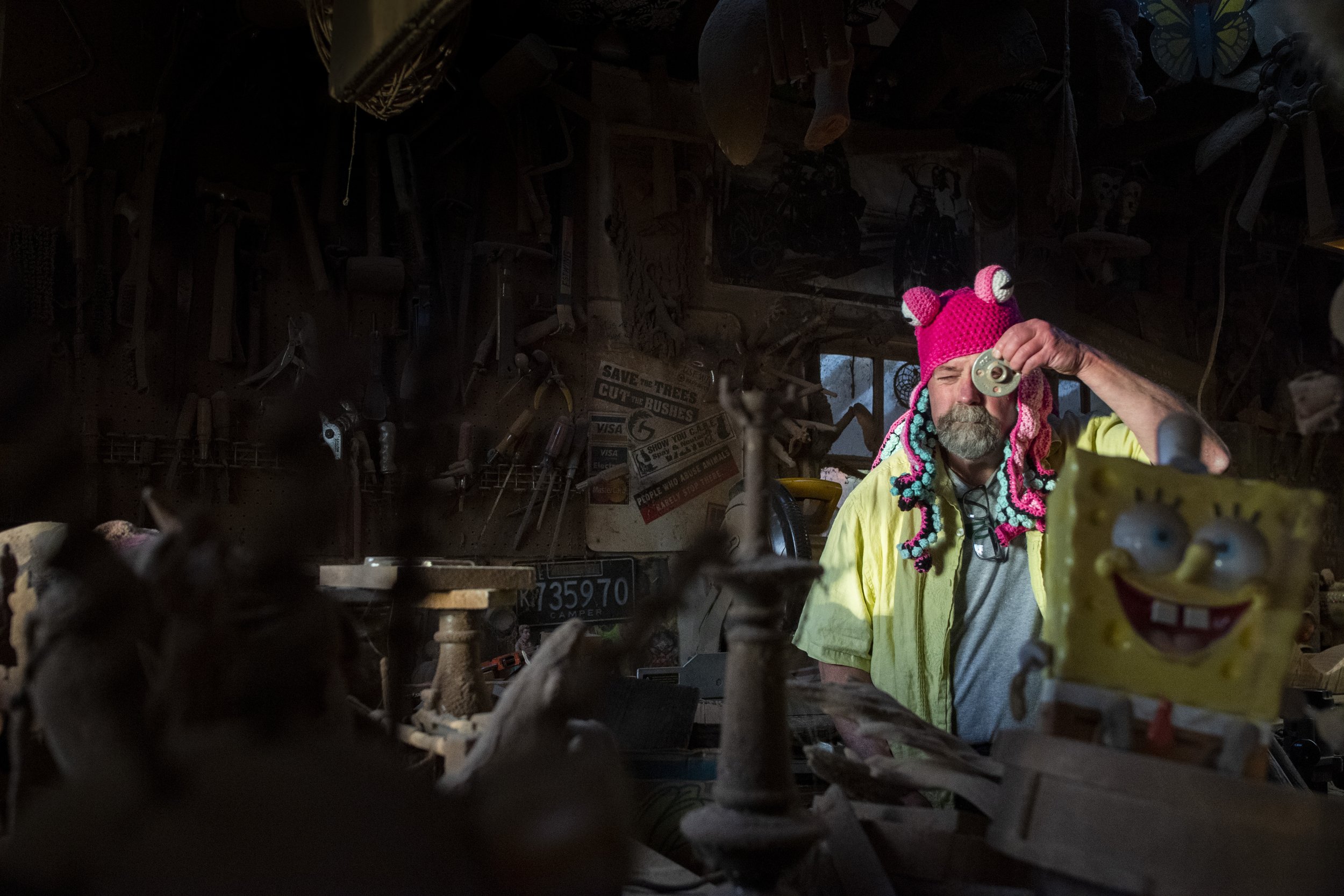in pursuit of happiness
written and photographed by ISAAC WASSERMAN
We all yearn for happiness. But as the turmoil of the last few years has shown, it is never guaranteed. Some Oregonians discover it by overcoming their most difficult struggles. Others find it in their dusty workshops, where they feel most centered. And others find it right before their eyes, though they may need binoculars to see it clearly. The following pages illustrate the complex journey to find one simple emotion.
Bright pink squid tentacles spill over artist Tim Boyden’s cheeks in his South Eugene garage studio. On this April day, Boyden is playful and cheerful. It’s a good day. Not all of them are. Boyden has manic depression.“I either feel way up here where I could do anything or way down there where I’ve never done anything right,” says Boyden, 64. But when Boyden is working on his art, he is happy. His creations, like large wooden forks and driftwood sculptures, lie about his garage. Here, he feels like he is nearing a per- fect emotional middle ground. “Happiness is a choice every moment of your life,” Boyden says. “Even in a hard time you can choose to be the calm in the storm.”
On Skinner Butte, looking over the city of Eugene, Lily Zeller (left) and her friend Kiana escape everyday life. In Zeller’s 2000 Chrysler Concorde named Coochie Couture, the young adults listen to music and make friendship bracelets. For many, the isolation, loss and constant fear felt during the pandemic made happiness hard to come by. The friends say their daily trip to the top of the butte helps them cope with the anxiety and other stressors in their lives. As Zeller puts it, “You just forget about everyday things.”
Norma Grier, far right, gazes toward the sky in search of birds to add to the day’s list of finds. The COVID-19 pandemic kept Grier, 72, and her friends from visiting Delta Ponds, a popular wetlands in North Eugene known for its varied bird species. With COVID-19 cases subsiding and binoculars in hand, Grier is rediscovering the pleasures in her life. “Happiness isn’t withdrawn,” Grier says. “It’s me being present and observant and connected with what’s happening around me.”
After 16 years of organizing the popular Eugene drag show Damsels, Divas and Dames, drag queen Daphne Storm organized the last production of the event on April 30. The show raises money for the HIV Alliance and brings the LGBTQ community together. Through the years, Eugene audiences embraced the event — and Storm embraced herself. “It’s kind of helped me blossom into actually who I was meant to be, rather than this quiet shy person in school,” says Storm, 62. During her finale at the Hult Center, Storm waved goodbye to a sold-out crowd as laughter and applause erupted. Storm says, “It was a bittersweet moment.”
Surrounded by plates of food, wool blankets and a small space heater, a group of women come together in Brenda Kame’enui’s garden house in South Eugene to celebrate a birthday. COVID-19 temporarily put a stop to the women’s celebrations, but as things start to improve, they’re gathering again. The group spends the evening sharing one another's company and reading poetry. “I take every opportunity I can, because tomorrow it could all be over to be with friends,” Kame’enui says.
“Creak-creak-creak.” In a big backyard, trampoline springs sing between shouts of glee that radiate into the neighborhood streets. Budding 6-year-old gymnast Catie Shorack flips through the air, a smile spreading from cheek to cheek. The trampoline, a new addition to Shorack’s life, has become a popular local attraction. During the peak of the COVID-19 pandemic, Shorack and her friends could not spend time together. The sound of laughter was in short supply. Now, with summer vacation approaching, Shorack’s thoughts about jumping on the trampoline with friends are plain and simple. “I love it,” she says.
When Andre Royal Sr. began to struggle with achalasia and narcolepsy, the life he had built for himself quickly slipped away. He had to quit his job, his relationships with family and friends weakened and he struggled to navigate life with the disorders. “Everyone was grieving the loss of the man I could have been,” Royal says. “I was dealing with that, too.” Out of necessity, Royal began to write. With the help of his son, he wrote and illustrated two color-in picture books. The characters on the page tell the stories of his life, and through their empowering presence, he is rebuilding his life, moving forward and finding happiness.

